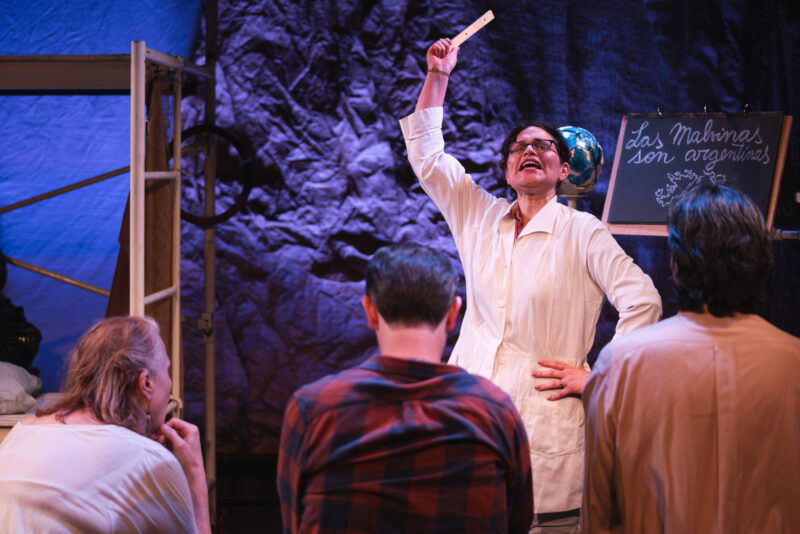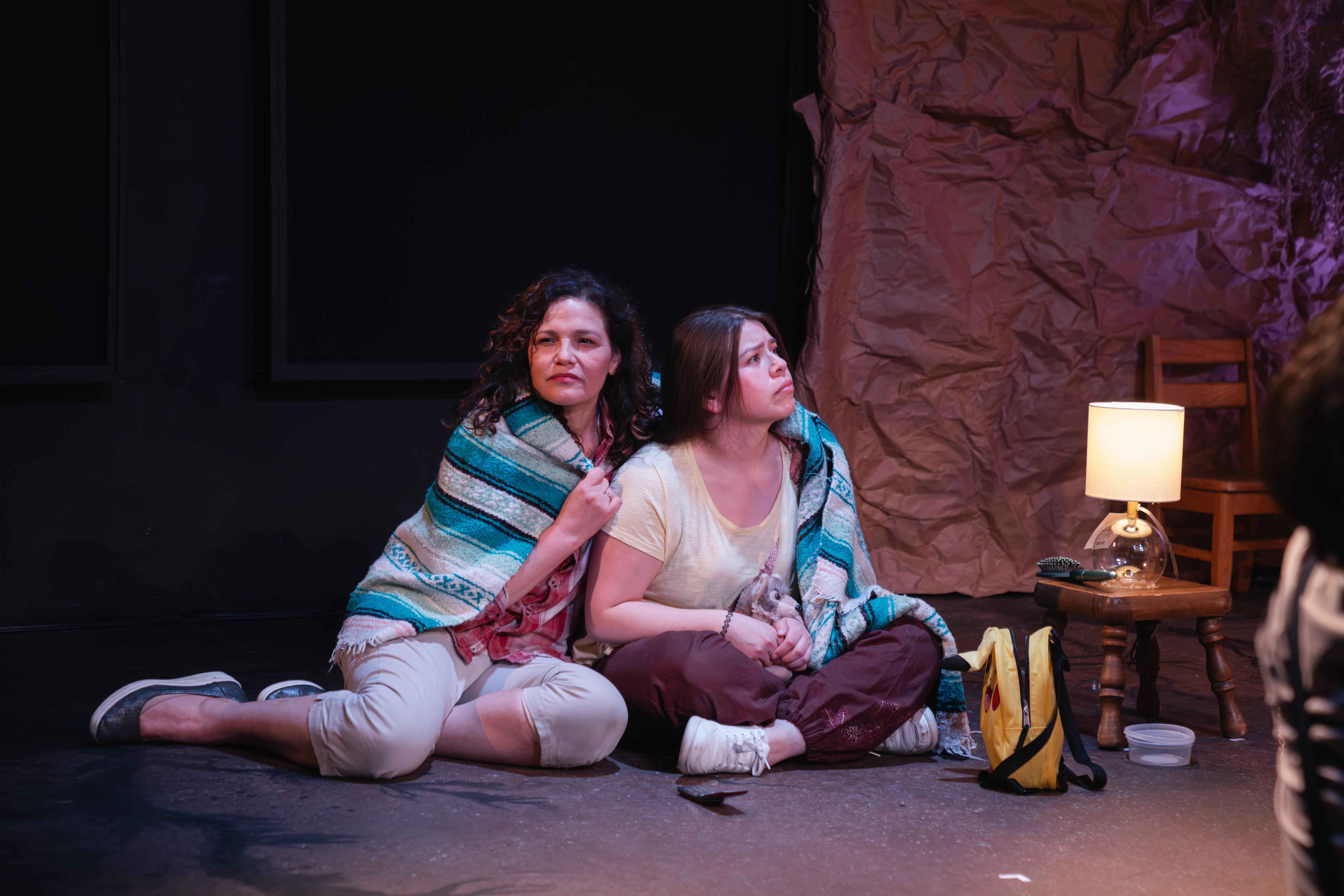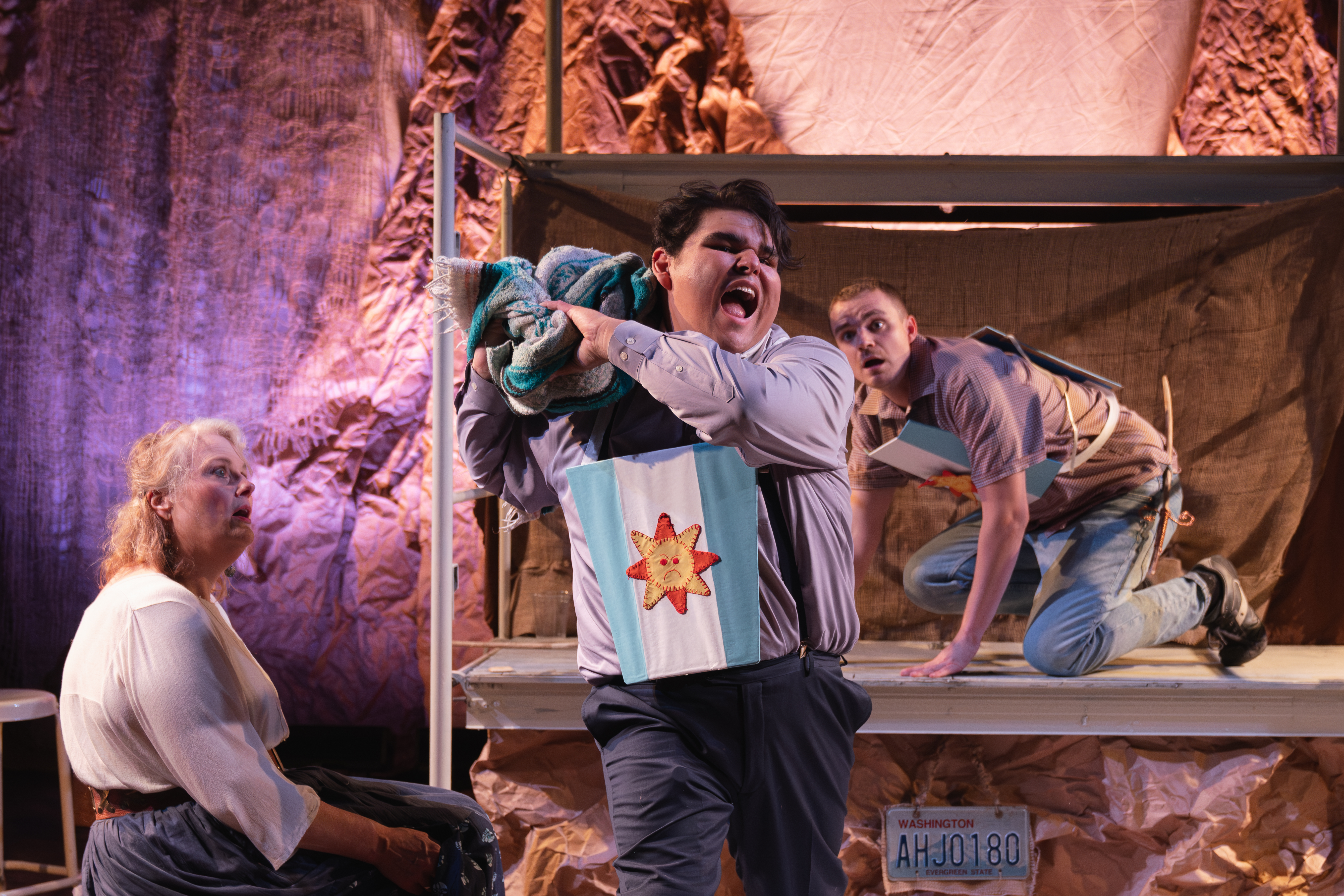Two Big Black Bags: A Journey to Self-Forgiveness
Review of Two Big Black Bags at West of Lenin
Written by TeenTix Newsroom Writer Juliana Agudelo Ariza and edited by Teen Editorial Staff Member Anna Melomed

With her unfettered ability to enthrall an audience, playwright Julieta Vitullo is no stranger to eclectic artistry. Her most recent composition titled Two Big Black Bags has begun its performances on the welcoming stage at West of Lenin in Fremont. Vitullo, an award-winning author and playwright, brings her unique perspectives and expertise to stage in a nostalgic yet lighthearted production that centers on a veteran in search of a way to amend the past.
After a night of carousing, James (Tadd Morgan) awakens to two black bags in his living room and no clue as to how they got there. This sparks a journey of self-introspection and healing as he travels all the way down to South America and the path to confronting his burdens. This performance and its theatrical constituents resonate and evoke genuine emotions in the audience, and highlight what life is like for those who endure life that follows war.
The stage is an ample live venue, within proximity of the audience, that allows for the audience to further engage with the actors’ dialogue and actions. The open space makes the most of each of its features. The lights are synchronized perfectly with the mood of the scenes; the flashbacks of battle where the rainstorms ravage through the fighting, and those which invoke an otherworldly experience. These sequences maintained the mysterious and exciting mood, keeping the audiences on the edge of their seats as James traversed the country, meeting characters that shed light on his past through magic encounters. The symbolism in mannerisms and environment can be seen with the Falkland Islands wolf, who made appearances on the stage during James’ flashbacks and represented the cultural aspects of Vitullo's upbringing in Argentina. This setup provides a welcoming experience and truly engages the audience in a whirlwind of magical storytelling.
The props are versatile and function like clockwork, with each member of the ensemble working diligently to achieve a beautiful scene. Using simple props made of cardboard and wood that also double as shelves, tables, and beds, the actors move swiftly and convert between scenes using only what they already have in front of them. There is a large wooden platform at the heart of the stage, which is transformed almost instantly from a balcony to a car, to a tent, in a matter of seconds by the actors draping nets or holding a wooden steering wheel. Though there are only six, the actors make use of the space splendidly by keeping the audience’s gaze on their every move and word; their grand movements across the stage, the script riddled with humoristic lines, and the elements of magical realism between the crude reality of the characters.
Vitullo’s desire to write this drama comes from her own recollection of the Falklands/Malvinas War. Growing up in Argentina in the 1980s she was exposed to the war in her classroom, where they would preach about the benefits of the war. The actor echoed this, saying, “El que no salta es inglés” (He who doesn’t jump is English), to refer to Argentina’s pride in its military and its confidence in their victory over the United Kingdom. Vitullo remembered that in her classrooms they would boast about Argentina’s military prowess while forgetting about the young 18-year-old soldiers who died not so far away. She decided to bring her knowledge about the war and turn it into a play rooted in her experiences and culture.
She says, “I believe fiction has been most successful in finding satisfactory responses to the questions and problems of the war.”

Vitullo met up with some veterans before she began drafting her script, and she was deeply impacted by the experience. She witnessed their retelling of firsthand accounts of war, and she based some of what James went through on the veterans she met and on her own life as well. Not only was the audience watching able to sympathize with the characters, but Vitullo herself saw her work unfold before her eyes.
“I was trying to find out what the bags were as much as him,” she said.
At the center of this theatrical sensation were the morals that Vitullo maintained as the cornerstone of the play. The characters found solace in each other as each underwent a unique change. Familial and personal values take center stage as each character, especially James, discovers a life that can flourish despite adversity. Throughout the story, we see how James’ family and his pleasant memories with them helped him forgive himself, and his love for his wife and daughter is reaffirmed in his nostalgic flashbacks. Even in his phone calls; as he lulled his daughter with princess stories and tales of naughty knights.
The audience got a chance to look at what veterans must experience, the feeling of being thrown blindly into the unknown. But what the play outlined most importantly was letting go of the baggage that weighs down on us. When we learn to forgive ourselves, we realize all the other valuable things that make life worth living. James’ adventure to reintegrate with his disenfranchised self can be ours for a night, and we get a taste of the unique cultural and personal aspects that Vitullo strived to convey in this play.
And so, as the actors took a final bow, the audience stopped to reflect upon the stories they witnessed. Pondering the same question Julia Vitullo asked herself, “How do we bear witness to the trauma of others? Is that even possible?”

Lead Photo Credit: Courtesy of West of Lenin, photo by Elodi Li
The TeenTix Newsroom is a group of teen writers led by the Teen Editorial Staff. For each review, Newsroom writers work individually with a teen editor to polish their writing for publication. The Teen Editorial Staff is made up of 5 teens who curate the review portion of the TeenTix blog. More information about the Teen Editorial Staff can be found HERE.
The TeenTix Press Corps promotes critical thinking, communication, and information literacy through criticism and journalism practice for teens. For more information about the Press Corps program see HERE.


